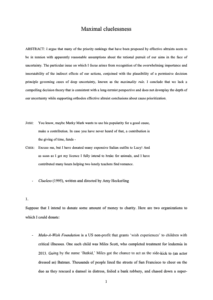Maximal cluelessness
Andreas Mogensen (Global Priorities Institute, Oxford University)
GPI Working Paper No. 2-2019, published in The Philosophical Quarterly
I argue that many of the priority rankings that have been proposed by effective altruists seem to be in tension with apparently reasonable assumptions about the rational pursuit of our aims in the face of uncertainty. The particular issue on which I focus arises from recognition of the overwhelming importance and inscrutability of the indirect effects of our actions, conjoined with the plausibility of a permissive decision principle governing cases of deep uncertainty, known as the maximality rule. I conclude that we lack a compelling decision theory that is consistent with a long-termist perspective and does not downplay the depth of our uncertainty while supporting orthodox effective altruist conclusions about cause prioritization.
Other working papers
Quadratic Funding with Incomplete Information – Luis M. V. Freitas (Global Priorities Institute, University of Oxford) and Wilfredo L. Maldonado (University of Sao Paulo)
Quadratic funding is a public good provision mechanism that satisfies desirable theoretical properties, such as efficiency under complete information, and has been gaining popularity in practical applications. We evaluate this mechanism in a setting of incomplete information regarding individual preferences, and show that this result only holds under knife-edge conditions. We also estimate the inefficiency of the mechanism in a variety of settings and show, in particular, that inefficiency increases…
In search of a biological crux for AI consciousness – Bradford Saad (Global Priorities Institute, University of Oxford)
Whether AI systems could be conscious is often thought to turn on whether consciousness is closely linked to biology. The rough thought is that if consciousness is closely linked to biology, then AI consciousness is impossible, and if consciousness is not closely linked to biology, then AI consciousness is possible—or, at any rate, it’s more likely to be possible. A clearer specification of the kind of link between consciousness and biology that is crucial for the possibility of AI consciousness would help organize inquiry into…
The epistemic challenge to longtermism – Christian Tarsney (Global Priorities Institute, Oxford University)
Longtermists claim that what we ought to do is mainly determined by how our actions might affect the very long-run future. A natural objection to longtermism is that these effects may be nearly impossible to predict— perhaps so close to impossible that, despite the astronomical importance of the far future, the expected value of our present actions is mainly determined by near-term considerations. This paper aims to precisify and evaluate one version of this epistemic objection to longtermism…

